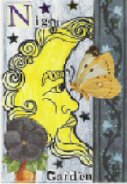
Rebecca
[Who Slammed Doors For Fun And Perished Miserably]
by
Hilaire Belloc
A Trick that everyone abhors
In little girls is slamming Doors
A wealthy banker's little daughter
Who lived in Palace Green, Bayswater,
[By name Rebecca Offendort],
Was given to the furious sport.
She would deliberately go
And slam the door like Billy-Ho!
To make her Uncle Jacob start.
[She was not really bad at heart.]
It happened that a marble bust
Of Abraham was standing just
Above the door the little lamb
Had carefully prepared to slam.
And down it came! It knocked her flat!
It laid her out! She looked like that!
Her funeral sermon (which was long
And followed by a sacred song)
Mentioned her virtues, it is true,
But dwelt upon her vices too,
And showed the dreadful end of one
Who goes and slams the door for fun!
~~~
This is the Hilaire Belloc poem from that same poetry book that I recited at my class concert I loved this poem, and especially loved reciting with relish the line 'little liar'. The thought of adult's saying that in a sniffy way to child asking for help was delicious.

Matilda
[Who told Lies, and was Burned to Death]
by
Hilaire Belloc
Matilda told such dreadful lies,
It made one gasp and stretch one's eyes;
Her aunt, who, from her earliest youth,
Had kept a strict regard for truth,
Attempted to believe Matilda:
The effort very nearly killed her,
And would have done so, had not she
Discovered this Infirmity.
For once, towards the Close of Day,
Matilda, growing tired of play,
And finding she was left alone,
Went tiptoe to the telephone.
And summoned the Immediate Aid
Of London's noble Fire-Brigade.
Within an hour the Gallant Band
Were pouring in on every hand,
From Putney, Hackney Downs and Bow,
With courage high and hearts a-glow.
They galloped, roaring though the town,
'Matilda's house is burning down!'
Inspired by British Cheers and Loud
Proceeding from the Frenzied Crowd,
They ran their ladders through a score
Of windows on the ball-room Floor;
And took peculiar pains to souse
The pictures up and down the house,
Until Matilda's Aunt succeeded
In showing them they were not needed
And even then she had to pay
To get the Men to go away!
It happened that a few weeks later
Here Aunt went off to the Theatre
To see that interesting Play
'The Second Mrs. Tanqueray.'
She had refused to take her Niece
To hear this Entertaining Piece:
A Deprivation Just and Wise
To Punish her for Telling Lies.
That night a fire did break out-
You should have heard Matilda Shout!
You should have heard her scream and bawl,
And throw the window up and call
To People passing in the Street-
The rapidly increasing Heat
Encouraging her to obtain
Their confidence-but it was all in vain!
For every time she shouted "Fire!"
They only answered "Little liar!"
And therefore when her Aunt returned,
Matilda, and the house, were burned.
~~~









